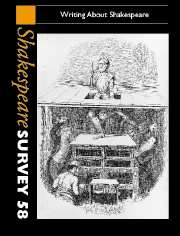Book contents
- Frontmatter
- Having Our Will: Imagination in Recent Shakespeare Biographies
- Toward a New Biography of Shakespeare
- Jonson, Shakespeare and the Exorcists
- ‘Lending soft audience to my sweet design’: Shifting Roles and Shifting Readings of Shakespeare’s ‘A Lover’s Complaint’
- ‘Armed at point exactly’: The Ghost in Hamlet
- Writing About Motive: Isabella, the Duke and Moral Authority
- Writing Performance: How to Elegize Elizabethan Actors
- Elizabeth Montagu: ‘Shakespear’s poor little Critick’?
- Rewriting Lear’s Untender Daughter: Fanny Price as a Regency Cordelia in Jane Austen’s Mansfield Park
- The Prequel as Palinode: Mary Cowden Clarke’s Girlhood of Shakespeare’s Heroines
- Shakespeare Among the Workers
- Virginia Woolf Reads Shakespeare: Or, her Silence on Master William
- Shakespeare and the Invention of the Epic Theatre: Working with Brecht
- Dramatizing the Dramatist
- Shakespeare in Drama Since 1990: Vanishing Act
- Writing about [Shakespearian] performance
- Shakespeare and the Prospect of Presentism
- Writing Shakespeare in the Global Economy
- The ‘Complexion’ of Twelfth Night
- Translation as Appropriation: Vassilis Rotas, Shakespeare and Modern Greek
- How Old Were Shakespeare’s Boy Actors?
- Mistress Tale Porter and the Triumph of Time: Slander and Old Wives’ Tales in The Winter’s Tale
- Shakespeare Performances in Ireland, 2002–2004
- Shakespeare Performances in England, 2004
- Professional Shakespeare Productions in the British Isles January–December 2003
- The Year's Contributions to Shakespearian Study 1 Critical Studies
- 2 Shakespeare in Performance
- 3 Editions and Textual Studies
- Books Received
- Index
Shakespeare and the Invention of the Epic Theatre: Working with Brecht
Published online by Cambridge University Press: 28 March 2007
- Frontmatter
- Having Our Will: Imagination in Recent Shakespeare Biographies
- Toward a New Biography of Shakespeare
- Jonson, Shakespeare and the Exorcists
- ‘Lending soft audience to my sweet design’: Shifting Roles and Shifting Readings of Shakespeare’s ‘A Lover’s Complaint’
- ‘Armed at point exactly’: The Ghost in Hamlet
- Writing About Motive: Isabella, the Duke and Moral Authority
- Writing Performance: How to Elegize Elizabethan Actors
- Elizabeth Montagu: ‘Shakespear’s poor little Critick’?
- Rewriting Lear’s Untender Daughter: Fanny Price as a Regency Cordelia in Jane Austen’s Mansfield Park
- The Prequel as Palinode: Mary Cowden Clarke’s Girlhood of Shakespeare’s Heroines
- Shakespeare Among the Workers
- Virginia Woolf Reads Shakespeare: Or, her Silence on Master William
- Shakespeare and the Invention of the Epic Theatre: Working with Brecht
- Dramatizing the Dramatist
- Shakespeare in Drama Since 1990: Vanishing Act
- Writing about [Shakespearian] performance
- Shakespeare and the Prospect of Presentism
- Writing Shakespeare in the Global Economy
- The ‘Complexion’ of Twelfth Night
- Translation as Appropriation: Vassilis Rotas, Shakespeare and Modern Greek
- How Old Were Shakespeare’s Boy Actors?
- Mistress Tale Porter and the Triumph of Time: Slander and Old Wives’ Tales in The Winter’s Tale
- Shakespeare Performances in Ireland, 2002–2004
- Shakespeare Performances in England, 2004
- Professional Shakespeare Productions in the British Isles January–December 2003
- The Year's Contributions to Shakespearian Study 1 Critical Studies
- 2 Shakespeare in Performance
- 3 Editions and Textual Studies
- Books Received
- Index
Summary
In David Lodge’s novel Small World, the Irish scholar Perse McGarricle is unable to get his thesis about Shakespeare’s influence on T. S. Eliot published, until having had a few drinks at a conference, he asserts that it is about ‘the influence of Eliot on Shakespeare’, explaining
We can’t avoid reading Shakespeare through the lens of T. S. Eliot’s poetry. I mean, who can read Hamlet today without thinking of ‘Prufrock’? Who can hear the speeches of Ferdinand in The Tempest without being reminded of ‘The Fire Sermon’ section of The Waste Land?
In building on McGarricle’s ground-breaking study, I hope to show that another great twentieth century poet and dramatist, Bertolt Brecht, had an even more profound influence on Shakespeare. Indeed, in writing the two parts of Henry IV, Shakespeare was the inventor of what Brecht and his colleague Erwin Piscator later called the ‘epic theatre’.
I am far from the first to see Shakespeare as an epic dramatist, and the work of another distinguished critic – one who actually exists – needs to be acknowledged. In his delightful review of Harold Bloom’s Shakespeare: The Invention of the Human for The New Statesman, Terence Hawkes writes:
The concern of the so-called ‘history plays’, as well as of most of the others, is as much with public as with private matters: with politics, economic and social structure, the world of governance and power, and the stresses and strains inherent in the construction of the project called ‘Great Britain’. They constitute what Brecht called ‘epic’ drama: its function to confront its audience with the ‘outer’ public world and to probe the insistent demands that that makes on any ‘inner’ private counterpart.
- Type
- Chapter
- Information
- Shakespeare Survey , pp. 130 - 136Publisher: Cambridge University PressPrint publication year: 2005

